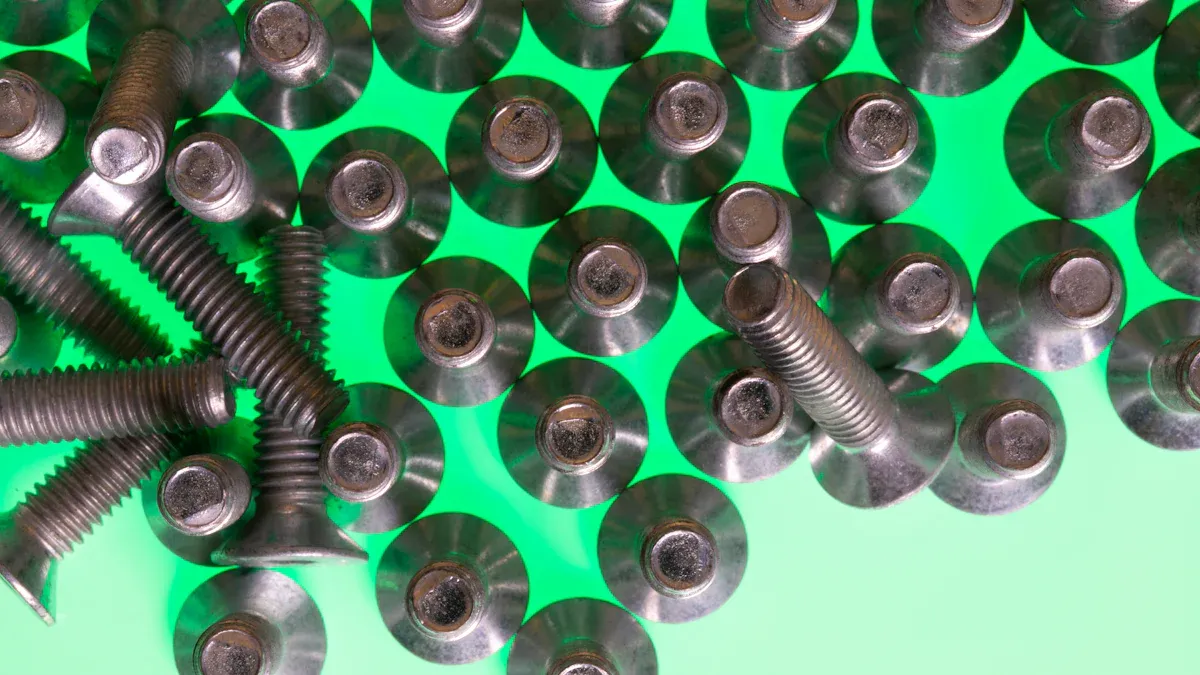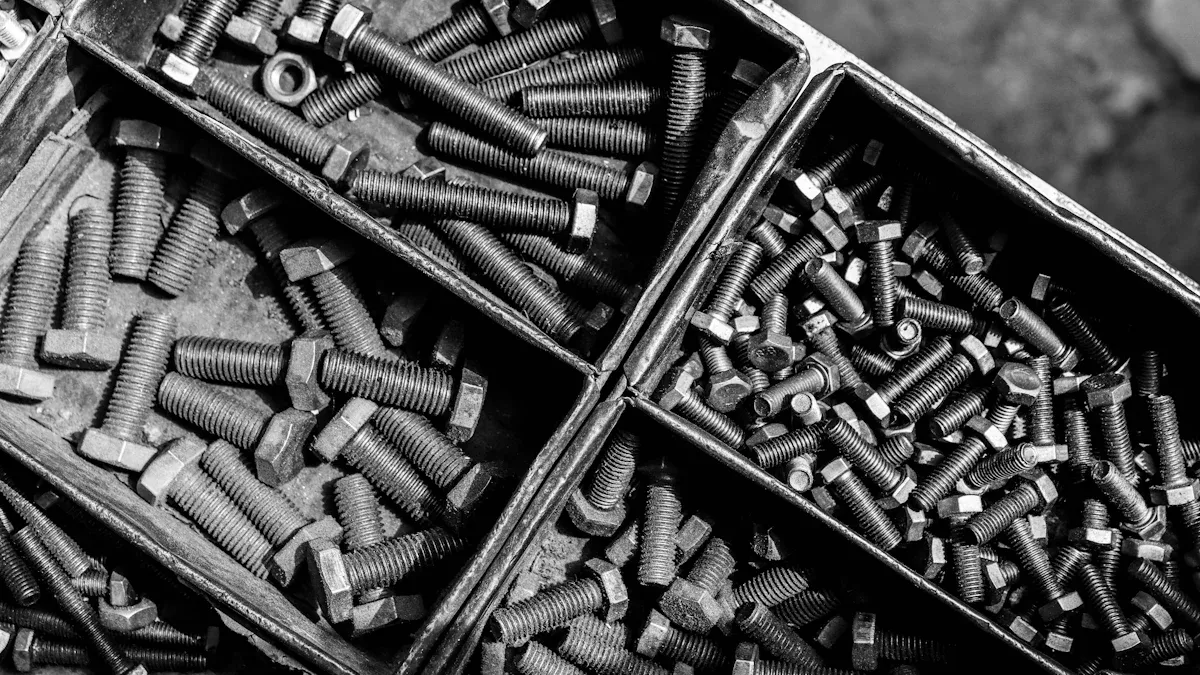
Heavy-duty fasteners connect critical components in construction and agricultural machinery. These fasteners, such as plow bolts and motor grader blade bolts, maintain joint strength, support structural integrity, and prevent equipment failures. High-strength plow bolts and motor grader blade bolts withstand harsh environments, ensuring reliable operation and reducing costly safety incidents.
Key Takeaways
- Choose the right heavy-duty fastener type and material to match your equipment’s load and environment for maximum strength and durability.
- Install fasteners carefully using the correct tools and torque to prevent damage, loosening, or failure during operation.
- Perform regular inspections and maintenance to spot wear or corrosion early, keeping equipment safe and extending fastener life.
Heavy-Duty Fasteners in Heavy Equipment

What Are Heavy-Duty Fasteners?
Heavy-duty fasteners play a vital role in connecting and securing parts in large machinery. These fasteners include bolts, nuts, screws, and washers. Manufacturers often choose steel, stainless steel, or aluminum for these components. Steel fasteners dominate the market because they offer high strength, durability, and cost-effectiveness. In fact, steel fasteners account for over 60% of global demand in the heavy-duty fasteners market.
Heavy-duty fasteners differ from standard fasteners in several ways:
- They have larger and thicker heads, which help distribute loads more evenly.
- They use higher-grade steel or alloy materials, meeting strict standards for strength and durability.
- Their load-bearing capacity is much higher, making them suitable for structural steel connections and critical machinery.
- Installation requires larger tools and higher torque.
“Custom fasteners are the cornerstone of reliable agricultural machinery, ensuring equipment runs efficiently and safely in harsh conditions.” – Industry Expert
Applications of Heavy-Duty Fasteners in Construction and Agriculture
Heavy-duty fasteners serve many functions in construction and agricultural equipment. The table below highlights their primary uses:
| Fastener Type | Primary Application in Agricultural Equipment |
|---|---|
| U-Bolts | Securing axles to springs, attaching pipes to frames, reinforcing structures |
| Plow Bolts | Attaching moldboards to plow frames, securing cultivator sweeps |
| Carriage Bolts | Implement frames, equipment guards, clean and snag-free fastening |
| Custom Pins | Quick-connect implements, hitch pins for three-point linkages |
| Hex Bolts | High-stress assemblies with custom thread pitches and lengths |
| Flange Bolts | Distributing clamping force on softer materials, preventing loosening |
| Eye Bolts | Securing tarps, attachment points for implements |
| Anchor Bolts | Securing grain bins, irrigation systems, and other infrastructure |
| Shoulder Bolts | Bearing surfaces for rotating parts like drive systems and pivot linkages |
Manufacturers select fastener materials based on strength, environmental exposure, and durability. Protective coatings like zinc plating or galvanization help extend fastener life in harsh conditions.
Types of Heavy-Duty Fasteners

Plow Bolts: Design, Features, and Uses
Plow bolts play a critical role in securing components on heavy machinery. Their unique design sets them apart from standard bolts. Manufacturers like Ningbo Digtech (YH) Machinery Co.,Ltd. produce plow bolts with features that enhance both performance and safety.
Key design features include:
- Large, flat, tapered heads that distribute torque evenly and sit flush with the surface. This prevents snagging and improves structural integrity.
- Short, robust shanks that fit into tight spaces, making installation possible in confined locations.
- Reduced torque requirements, which allow secure tightening without damaging threads or surrounding materials.
- Countersinking capability, ensuring the bolt head sits flush beneath the surface for a smooth finish.
- Marked heads with unique symbols for easy identification during maintenance.
Plow bolts often feature a flat, countersunk head and a square collar, conforming to ASME B18.9 standards. Grade 5 plow bolts use heat-treated medium-grade carbon steel for moderate strength, while Grade 8 bolts use heat-treated alloy steel for higher tensile strength. These bolts are common in road graders, scoop shovels, and agricultural plows.
Material selection depends on the application:
- Carbon steel provides good tensile strength for general use.
- Stainless steel (SS304, SS316) offers superior corrosion resistance for outdoor or marine environments.
- Alloy steel and boron steel deliver enhanced strength and wear resistance for high-load or extreme conditions.
- Heat-treated steel resists deformation in high-stress applications.
Surface finishes such as zinc plating, hot-dip galvanizing, and Teflon coating protect against corrosion and wear. The flat, countersunk head sits flush with the material, reducing wear and supporting longer service life. The square neck locks into the material, preventing bolt rotation and allowing secure one-sided installation.
Plow bolts are primarily used to secure cutting edges and components on snowplows, graders, and bulldozers. Their flush head design allows soil or debris to pass smoothly over the bolt, which is essential in earth-moving and snow removal equipment. Grade 5 carbon steel bolts suit moderate loads in farm machinery, while Grade 8 alloy steel bolts handle high-impact, heavy-duty equipment. Coated bolts resist corrosion in outdoor environments.
Compared to other fasteners, plow bolts provide reinforced strength and wear resistance. Their flush fitting reduces wear and snagging, making them ideal for high-wear applications in construction and agriculture.
Tip: Always select the correct bolt type, size, and grade to ensure peak performance and durability in heavy equipment.
Motor Grader Blade Bolts: Design, Features, and Uses
Motor grader blade bolts secure the blades on graders, which are machines used to level surfaces in road construction and maintenance. These bolts must withstand constant vibration, impact, and exposure to harsh environments.
Proper installation of motor grader blade bolts involves several steps:
- Position the new blade carefully and align it with the mounting area.
- Insert bolts through the blade and grader holes, hand-tightening them to hold the blade in place.
- Verify blade alignment using a straightedge or laser alignment tool.
- Use a torque wrench to tighten bolts to the manufacturer’s recommended torque. This prevents over-tightening, which can cause damage, and under-tightening, which can lead to loosening during operation.
- Re-check blade alignment after tightening to ensure stability.
- Conduct a test run to observe blade performance and listen for unusual noises or vibrations.
- Establish regular maintenance, including periodic bolt tightness checks, especially after the initial hours of operation.
Motor grader blade bolts enhance durability and performance by maintaining secure blade attachment. This prevents uneven wear and ensures consistent grading results. High-quality bolts from suppliers like Ningbo Digtech (YH) Machinery Co.,Ltd. help extend the service life of grader blades and reduce downtime.
Other Common Heavy-Duty Fasteners
Heavy-duty fasteners come in many forms, each serving a specific purpose in construction and agricultural equipment. The table below summarizes some of the most common types and their primary functions:
| Fastener Type | Features / Description | Primary Functions / Uses |
|---|---|---|
| Bolts | Threaded shaft, hexagonal head, high tensile strength | Hold materials together with nuts; used in construction, machinery, automotive, and heavy wood projects. |
| Nuts | Internal threads, various shapes (hex, square, wing) | Secure bolts; resist loosening (lock nuts); allow hand tightening (wing nuts). |
| Washers | Thin plates with holes, various designs | Distribute load, reduce friction, prevent loosening. |
| Screws | Threaded shafts, may not require nuts | Fasten materials directly; used in metal, wood, and plastic assemblies. |
| Nails | Smooth shaft, various head shapes | Driven into wood to hold components; used in construction and woodworking. |
| Anchors | Connect items to firm materials like drywall or concrete | Provide secure attachment points in masonry or hollow walls. |
| Threaded Rods / Studs | Long rods with threads on one or both ends | Used for full engagement with nuts or for specific fastening needs. |
Manufacturers like Ningbo Digtech (YH) Machinery Co.,Ltd. supply a wide range of heavy-duty fasteners to meet the needs of different industries. Choosing the right fastener type ensures strong, reliable connections and supports the safe operation of heavy equipment.
Selecting and Maintaining Heavy-Duty Fasteners
Material, Size, and Strength Considerations
Selecting the right material and size ensures fasteners perform well in demanding environments. Material properties such as strength, corrosion resistance, and toughness directly affect performance.
- Steel fasteners offer high tensile strength but need coatings to resist corrosion.
- Stainless steel provides excellent rust resistance and works well in harsh or wet conditions.
- Brass and bronze resist corrosion but are softer and cost more than steel.
- Titanium delivers a strong, lightweight option for high-performance needs.
Grades like Grade 5 and Grade 8 indicate tensile strength. Higher grades suit extreme loads. Surface finishes such as zinc plating or hot-dip galvanizing add durability. Alloying elements like chromium and molybdenum improve strength and corrosion resistance. Custom fasteners can match exact size and thread requirements for specific equipment.
Tip: Always match fastener material and grade to the equipment’s load and environment.
Installation and Torque Best Practices
Proper installation prevents failures and keeps equipment safe.
Common errors include using the wrong tool, applying incorrect torque, or choosing the wrong fastener size. These mistakes can cause stripping, loosening, or even breakage.
- Use the correct tool and follow manufacturer torque specifications.
- Avoid over-tightening, which can damage threads or compress washers.
- Ensure fasteners fit the substrate and are installed to the right depth.
Vibration and corrosion can loosen fasteners over time. Lock nuts or self-locking threads help maintain tightness in high-vibration settings.
Maintenance for Safety and Longevity
Routine maintenance extends the life of heavy-duty fasteners and equipment.
- Inspect fasteners regularly for signs of wear, corrosion, or loosening.
- Clean equipment to remove dirt and debris that can cause corrosion.
- Lubricate fasteners with manufacturer-recommended products to reduce friction.
- Protect equipment from harsh weather by storing it in covered areas.
- Train operators to handle equipment properly and avoid overloading.
Keeping detailed maintenance records helps track fastener condition and schedule timely replacements.
Selecting the right fastener ensures equipment safety and performance. Experts advise considering load, environment, and standards. Suppliers and manufacturers help customers match fasteners to project needs, offering guidance and ongoing support. Regular maintenance and proper installation protect equipment and extend service life.
FAQ
What makes plow bolts different from standard bolts?
Plow bolts have a flat, countersunk head. This design allows the bolt to sit flush with the surface, reducing wear and preventing snagging during equipment operation.
How often should heavy-duty fasteners be inspected?
Experts recommend checking fasteners before each use. Regular inspections help spot wear, corrosion, or loosening early, which improves equipment safety and reliability.
Can one use regular bolts instead of motor grader blade bolts?
No. Motor grader blade bolts use specific materials and designs for high stress. Using regular bolts can cause equipment failure or unsafe conditions.
Post time: Jul-18-2025